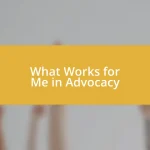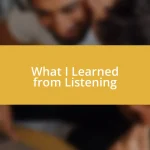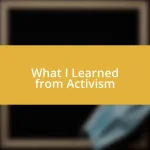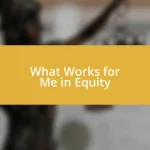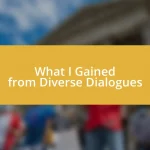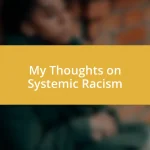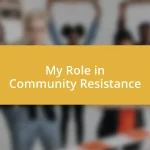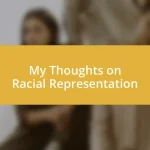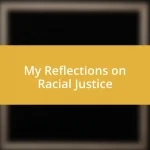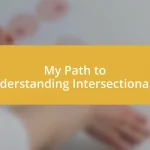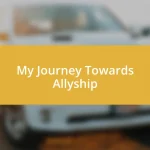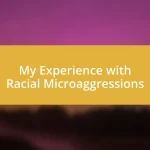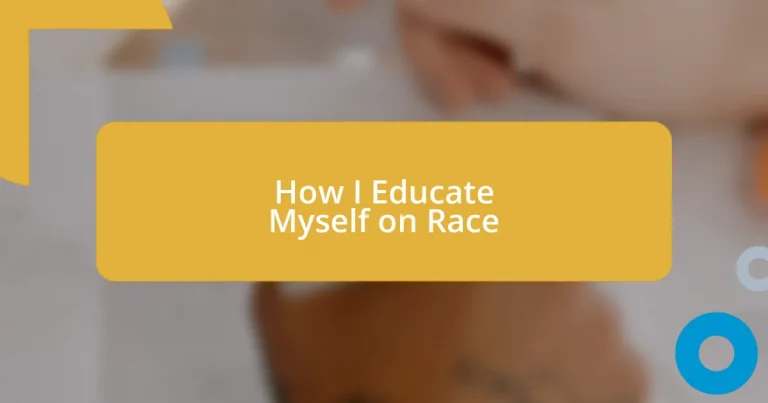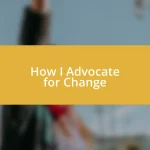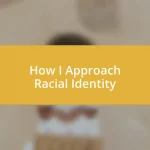Key takeaways:
- Understanding that race is a social construct and acknowledging its implications in personal and societal contexts.
- Engaging with diverse literature, documentaries, and community dialogues fosters empathy and broadens perspectives on race.
- Participating in workshops enhances critical thinking about biases and promotes meaningful action towards racial equity.
- Building a continuous learning habit, such as reading and discussing race-related topics, deepens understanding and encourages collective growth.
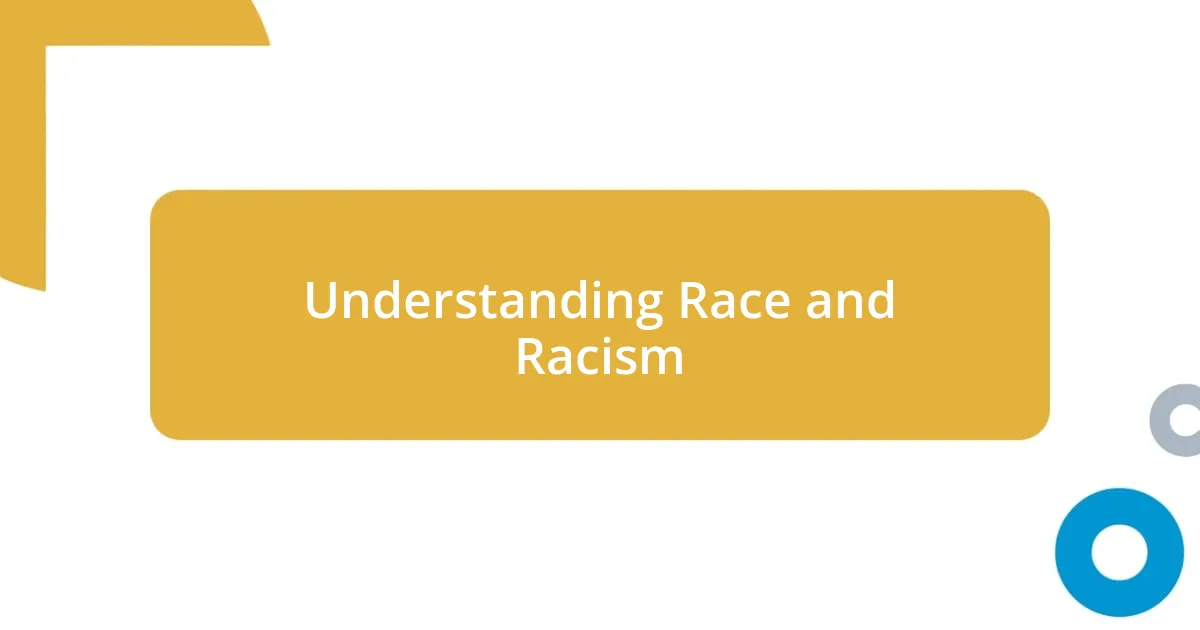
Understanding Race and Racism
Understanding race and racism can be a winding road, and to me, it’s essential to grasp that race is primarily a social construct rather than a biological fact. Growing up, I often wondered why my friends came from different backgrounds, yet we shared so much in common. In reflecting on this, I realized that our differences in race shouldn’t define our interactions; rather, they can enrich them.
When I first encountered racism, it felt like a punch in the gut. I witnessed a friend being dismissed because of their skin color, leaving me questioning why society still allows such ignorance. In those moments, I couldn’t help but think: how can we stand by and let this happen? This question has driven me to learn more about the systems that perpetuate racism, pushing me to see how deeply embedded these issues are in our institutions and daily lives.
Racism isn’t merely about personal prejudice; it’s about power dynamics and societal structures. When I delve into this topic, I often reflect on historical contexts and modern implications—like how policies and practices can marginalize entire communities. This exploration made me realize that understanding race isn’t just an academic endeavor; it’s a call to action in my own life. What steps can I take to combat racism in my day-to-day interactions? It’s an ongoing journey that challenges me to grow and engage with others in meaningful ways.
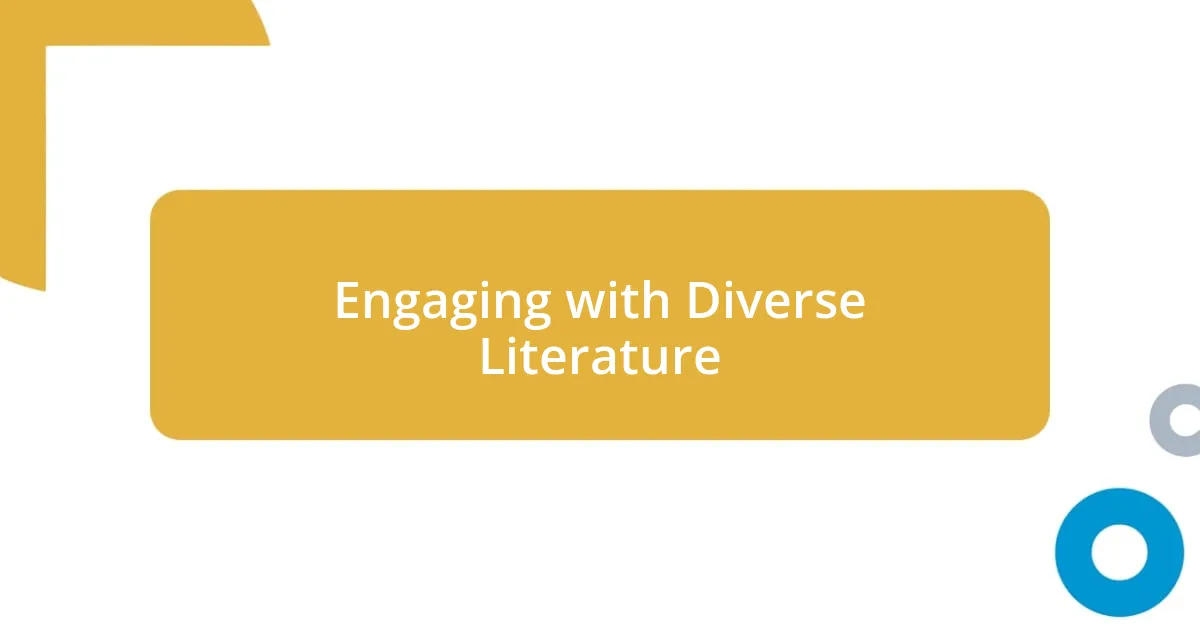
Engaging with Diverse Literature
Engaging with diverse literature has profoundly shaped my understanding of race. One memorable experience was reading “The Color Purple” by Alice Walker. The raw emotion and life experiences portrayed in the novel left me feeling connected to a different reality. It was a stark reminder that diversity in stories allows us to step into someone else’s shoes, cultivating empathy and a broader perspective.
As I include books from various authors in my reading list, I pay special attention to those that tackle race and identity. Here’s a collection of titles that have significantly influenced my journey:
- “Between the World and Me” by Ta-Nehisi Coates: A powerful letter from a father to his son, exploring the realities of being Black in America.
- “Just Mercy” by Bryan Stevenson: A groundbreaking account of racial injustice, invoking a deep sense of responsibility to advocate for change.
- “The Hate U Give” by Angie Thomas: This young adult novel offered a modern lens on race relations, making it relatable and urgent for today’s youth.
- “Homegoing” by Yaa Gyasi: A multi-generational saga that intricately weaves personal and historical narratives, demonstrating the lasting impact of slavery.
Incorporating these stories into my reading has not only enhanced my knowledge but has also fostered a lasting sense of cultural appreciation.
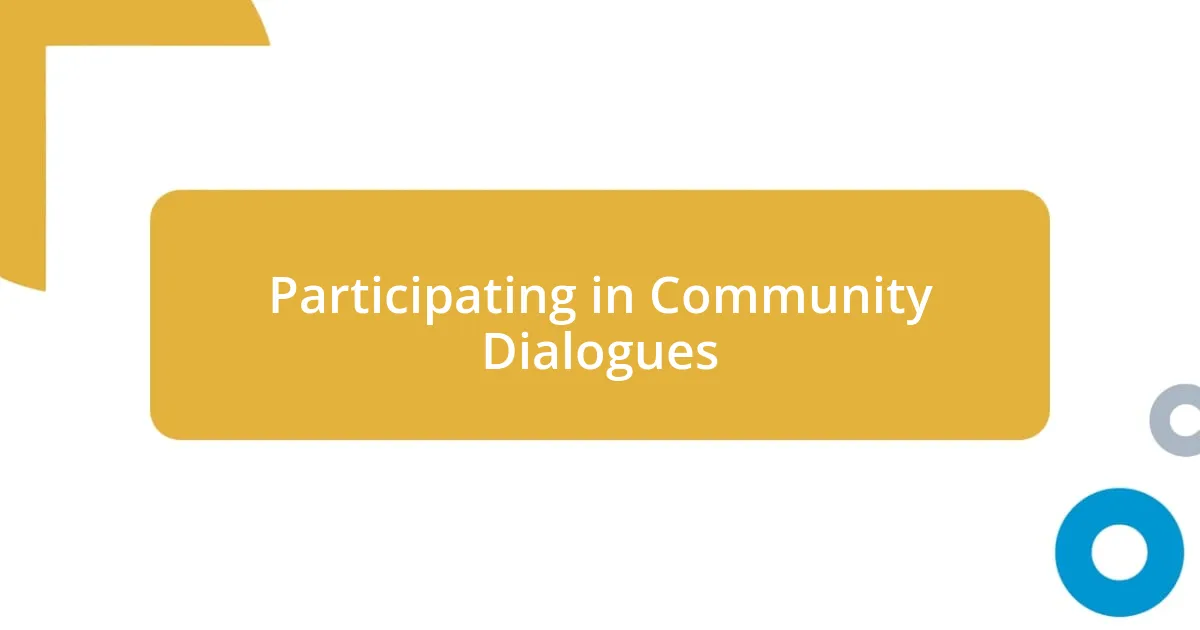
Participating in Community Dialogues
Participating in community dialogues has been one of the most eye-opening experiences in my journey of educating myself about race. I remember attending a local town hall meeting focused on racial equity. The raw honesty shared by participants struck a chord with me; their stories reflected both pain and resilience. It was humbling to listen and learn from others who lived different realities, reminding me that every voice matters in this discourse.
I’ve also found that engaging in community dialogues often leads to unexpected connections. These conversations allow for vulnerability, sparking a unique environment where people feel safe to share their truths. One evening, during a facilitated discussion, a woman shared her experiences facing discrimination in the workplace. Her emotional recounting brought tears to my eyes, and I realized the privilege I had taken for granted. I left the meeting feeling compelled to not only support her story but also to champion the voices of marginalized individuals in my own circles.
A great benefit of these dialogues lies in their potential for action. They serve as springboards for collective efforts to dismantle racism in our neighborhoods. After a recent community forum, a group of us organized workshops on anti-racism awareness, and I took on the role of facilitator. It was empowering to witness participants—of all backgrounds—engage passionately, share ideas, and brainstorm inclusive initiatives. I couldn’t help but think: Isn’t this the essence of community? Transforming dialogue into meaningful action brings hope and creates lasting change.
| Benefits of Community Dialogues | Personal Experiences |
|---|---|
| Fosters Connection | Listening to diverse stories enriches understanding. |
| Encourages Vulnerability | Witnessing shared experiences creates empathy and awareness. |
| Leads to Action | Transforming dialogue into initiatives promotes change. |
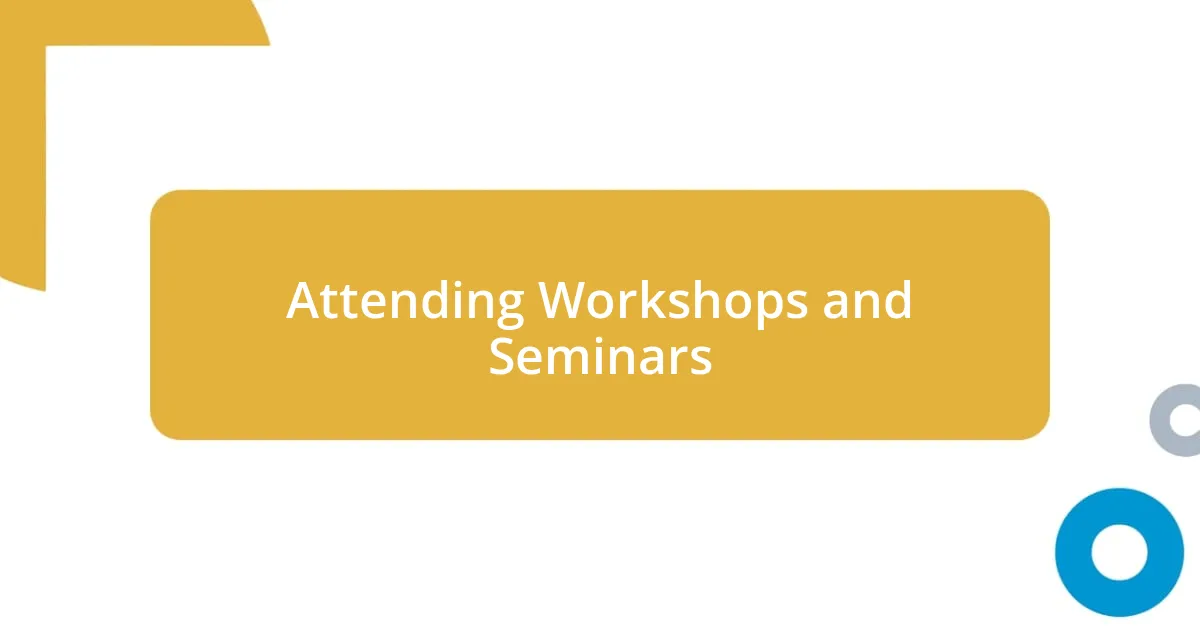
Attending Workshops and Seminars
Attending workshops and seminars has been an integral part of my journey in understanding race. A few years ago, I participated in a seminar focused on racial biases in education. The facilitator’s approach was refreshing; they encouraged open discussions and fostered a safe space for everyone to voice their experiences. I remember feeling a mix of anxiousness and excitement as we tackled sensitive topics. But by the end, I realized how vital these conversations are for shedding light on often overlooked issues.
I recently attended an interactive workshop on cultural competency that truly changed my perspective. It wasn’t just about listening; we engaged in role-playing exercises that put us in the shoes of others. I vividly recall one scenario where I had to navigate a conversation about race with someone from a different background. It led me to question my assumptions and biases in real-time. Has anyone else felt that stark realization when faced with their own misconceptions? I certainly did, and it sparked a deeper commitment within me to continue learning.
Moreover, I find that these events often lead to unexpected friendships and alliances. Just last month, I met a wonderful group of individuals during a seminar on privilege and power dynamics. We bonded over shared experiences and a mutual goal of promoting inclusivity. Sharing our stories in that setting created an instant connection, and it left me feeling hopeful about the possibility of collective action. Don’t you agree that when we gather to learn, it enriches our understanding and strengthens our community? I left the seminar inspired to take the conversations beyond the walls of the workshop and into my daily life.
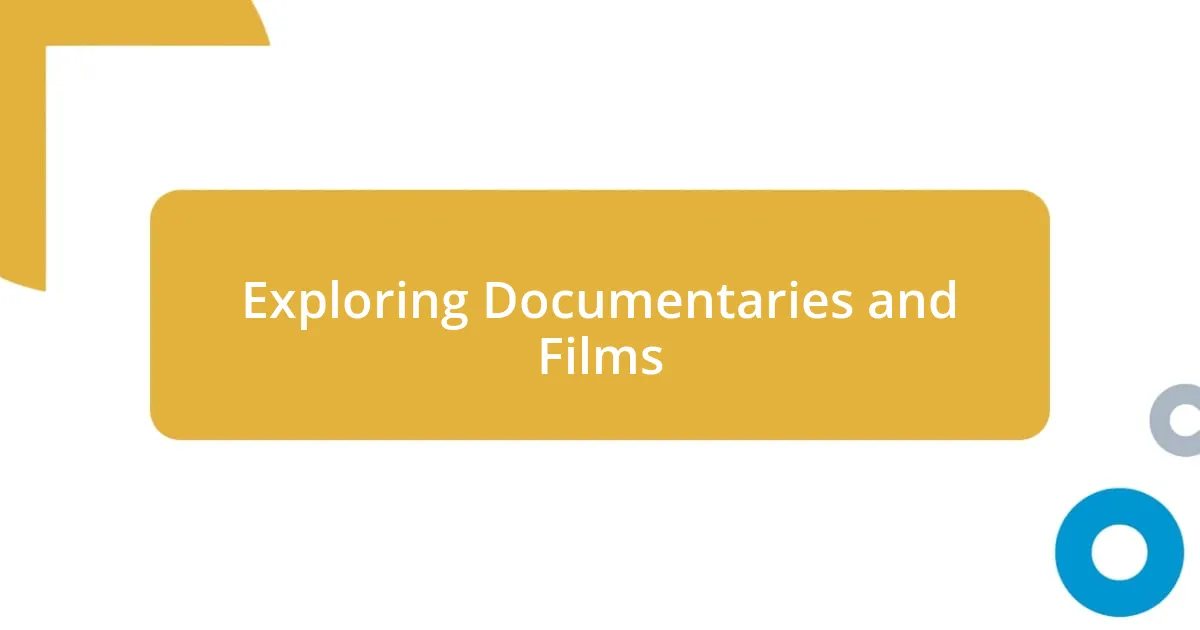
Exploring Documentaries and Films

Exploring Documentaries and Films
Diving into documentaries and films has been a powerful part of my self-education on race. I recall watching 13th, directed by Ava DuVernay, which delves into the intersection of race, justice, and mass incarceration in the U.S. During the film, I felt a mix of anger and sadness as it exposed systemic injustices that I had previously overlooked. Has anyone else experienced a moment in a film that challenged their perspective? For me, that was it; I found myself questioning the narratives I had accepted and searching for deeper truths about my own biases.
Another film that profoundly impacted me was Black Panther. It wasn’t just about an entertaining superhero story; it opened discussions around representation and identity. The portrayal of African culture and the powerful messages about heritage struck a chord with me. I remember discussing the film with friends afterward, and the passionate debate revealed how movies can spark necessary dialogues about race, identity, and belonging. How incredible is that? Stories told through cinema can inspire us to engage more thoughtfully with complex societal issues.
I also enjoy exploring documentaries that spotlight race-related themes, such as The Hate U Give. It made me reflect on the experiences of young people facing racial injustice and the courage it takes to speak out. I found myself recalling my own childhood experiences and how these narratives resonated with my upbringing. Watching these films compels me to reflect and engage in meaningful conversations, not just within my circle, but also in broader contexts. It’s incredible to think about how visual storytelling can bridge gaps and foster understanding, isn’t it?
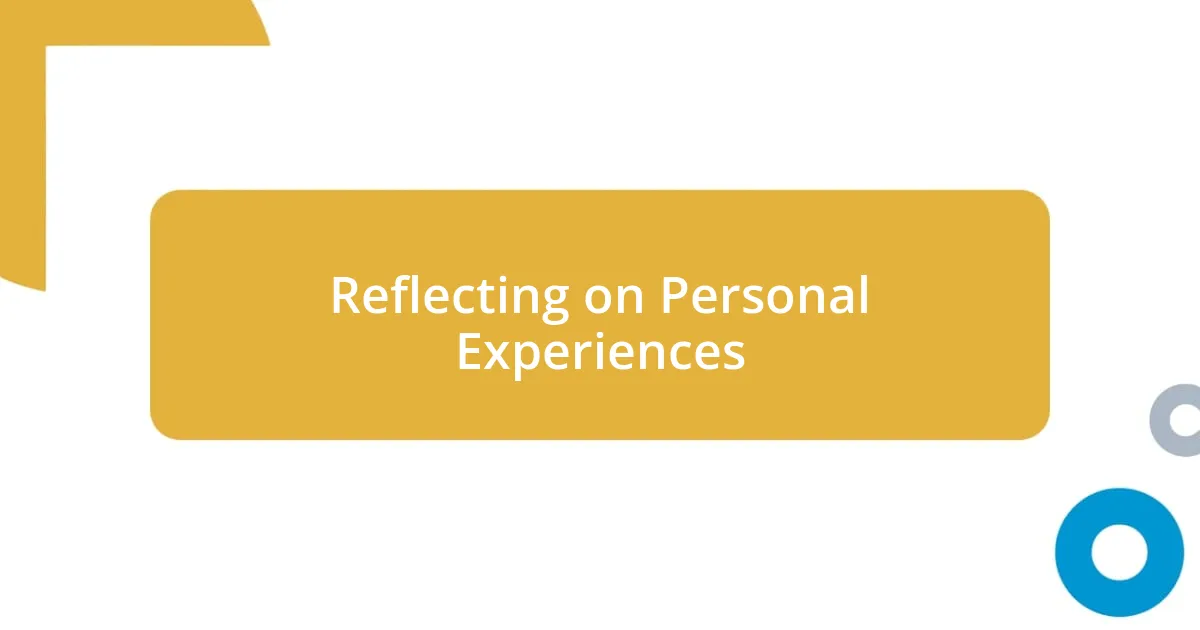
Reflecting on Personal Experiences
Reflecting on my personal experiences has been a true eye-opener in my journey toward understanding race. There was a time during high school when I overheard a friend’s conversation about the challenges faced by students from different racial backgrounds. I remember feeling a pang of discomfort—I realized how little I really knew about systemic issues affecting others. That moment pushed me to reflect on my own privilege and how often I had overlooked the experiences of those around me.
One particularly revealing experience happened during a community service project. I worked alongside a diverse group of volunteers, each sharing their unique stories. At one point, a fellow volunteer opened up about growing up in a neighborhood marked by racial tension. Listening to her, I felt a deep connection as she recounted her struggles. It made me question my assumptions about what others might be experiencing in their daily lives. Have you ever been in a situation where someone’s story resonated so deeply that it changed your perspective? That encounter reaffirmed the importance of empathy and listening.
Sometimes, I find myself reflecting on my childhood and how my understanding of race has evolved. I recall moments when I played with children from various backgrounds, blissfully unaware of racial divides. Yet, growing older, I found those innocent interactions marred by societal perceptions about race. How different would my perspective be if I had stayed in that innocent bubble? I often wonder if we could all embrace that childlike curiosity again. Engaging in reflection not only allows me to confront uncomfortable truths but also inspires me to create a more inclusive environment for myself and others.
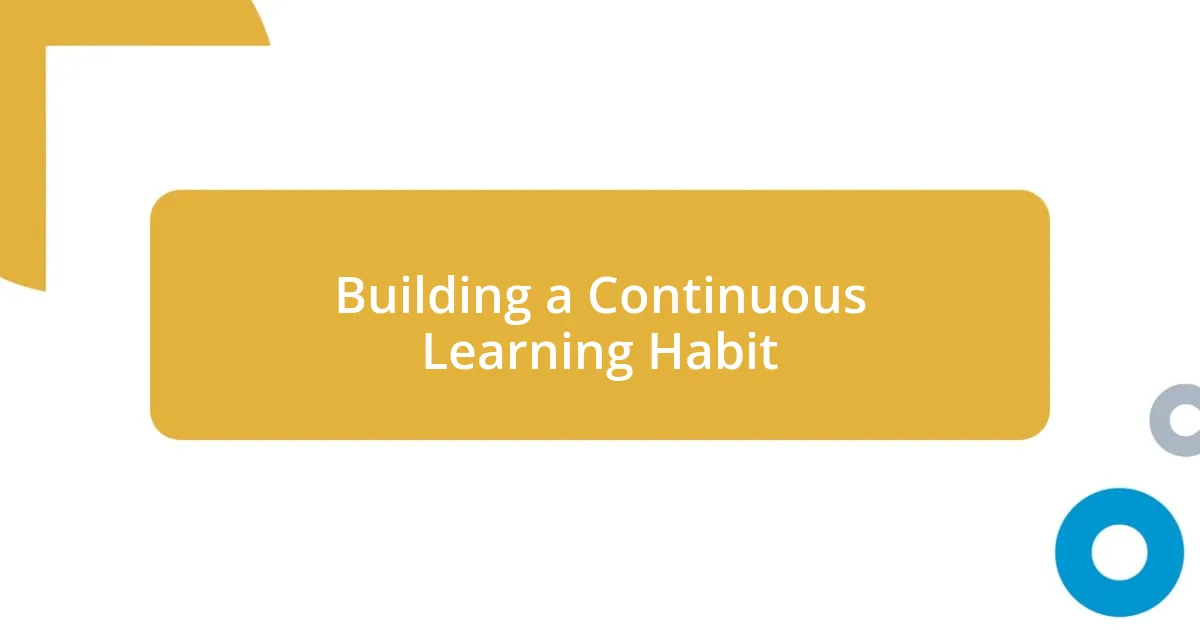
Building a Continuous Learning Habit
Building a continuous learning habit can feel overwhelming at times, but I’ve discovered that weaving it into my daily routine makes it manageable. I start each morning with a dedicated reading session, focusing on books that explore race and identity. I often ask myself, “What new perspective will I gain today?” It’s like a daily gift to myself that fosters curiosity and encourages deeper understanding.
I also find it helpful to set small, achievable goals. For instance, I aimed to watch one documentary a week. It became a ritual for me. After each viewing, I would jot down my thoughts and feelings, allowing me to engage critically with the material. Have you ever kept a journal for your reflections? Writing down my insights not only solidifies my learning but also sparks meaningful conversations with friends.
Recently, I joined an online discussion group where we share articles and resources about race. This community aspect has significantly enhanced my learning journey. The diverse viewpoints help me challenge my own beliefs and broaden my understanding. I often think, “How can we grow if we only surround ourselves with voices that echo our own?” Engaging with different perspectives helps break down barriers and fosters continuous growth, making the learning process not just personal but collective.
